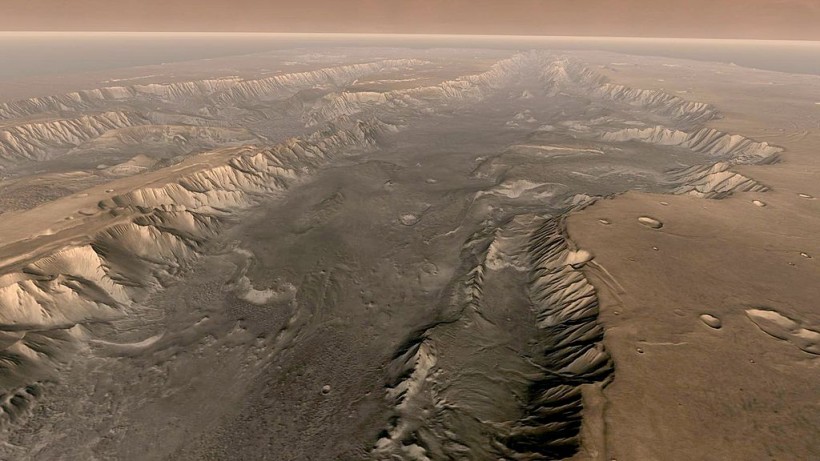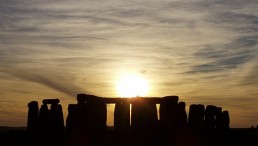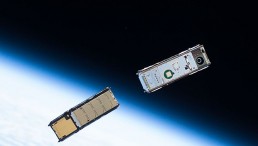According to a recent analysis of a rare Martian meteorite that fell on Earth, scientists may need to alter their chronology for when Mars was habitable.
In 2011, a meteorite known as Black Beauty was discovered in the Saharan Desert. Northwest Africa (NWA) 7034 is its official name. The meteorite was initially described in a 2013 research that dated it to around 2.1 billion years old. Its gloomy look gave it the moniker "Black Beauty."
The little area of Mars' surface is mostly formed of basalt and contains rock fragments and minerals, including some extremely ancient zircon grains.

VALLES MARINERIS, MARS - Mars' own Grand Canyon, Valles Marineris, is shown on the surface of the planet in this composite image made aboard NASA's Mars Odyssey spacecraft. The image was taken from a video featuring high-resolution images from Arizona State University's Thermal Emission Imaging System multi-band camera on board the spacecraft. The mosaic was then colored to approximate how Mars would look to the human eye. Valles Marineris is 10 times longer, five times deeper and 20 times wider than Earth's Grand Canyon.
Black Beauty Mars Meteorite Adds To Evidence of Life in Red Planet
Morgan Cox, a Ph.D. candidate at Curtin University, led a research team that looked at zircon grains from Black Beauty. Researchers focused on a grain of zircon that displays the type of shock damage that often results from big meteorite impacts severe smashes on the magnitude that wiped out the dinosaurs on Earth.
"This grain is truly a one-off gift from the red planet. High-pressure shock deformation has not previously been found in any minerals from Black Beauty," Cox said in a statement.
Cox went on to say that the discovery of shock damage in a 4.45 billion-year-old Martian zircon adds to the growing body of evidence for dynamic events that shaped the early Martian landscape.
The zircon is assisting scientists in determining the timing for Mars' possible habitability. Prior studies of zircon in Martian meteorites suggested that circumstances appropriate for life may have existed around 4.2 billion years ago based on the absence of conclusive shock damage, study co-author Aaron Cavosie said. According to the Black Beauty zircon, Mars appears to have been badly beaten up at this period.
About NWA 7034
Science Alert said NWA 7034 is a 320-gram (11.3-ounce) piece of volcanic breccia found in Morocco's the Sahara Desert in 2011. It is made out of chunks of several sorts of rock, similar to a fruit cake.
It's mostly basalt with a few zircon crystals. Some date back to 4.45 billion years, making it nearly as old as the planet itself.
The early Solar System was far more chaotic than it is now. We've discovered evidence that huge asteroid impacts wreaked havoc on the inner planets early on.
The absence of overall shock damage in the zircons from NWA 7034 was previously used as proof that the intensive period of bombardment on Mars had ended around 4.48 billion years ago. As a result, it's possible that Mars was habitable very early on.
Despite the fact that the team only discovered twinning in one of their zircon crystals, that one crystal suggests a formation process similar to what we've seen on Earth, involving high pressure, most likely from an asteroid impact. It shows that significant bombardment on Mars occurred at least 30 million years after the prior estimate, according to the researchers.
As a result, conditions may not have been favorable for life until later - which coincides with the Mars timeline for another condition conducive to life as we know it, according to the researchers.
Researchers detailed their study, "Impact and Habitability Scenarios for Early Mars Revisited Based on a 4.45-GA Shocked Zircon in Regolith Breccia," in the journal Science Advances.
RELATED ARTICLE: NASA Mars Reconnaissance Orbiter Says Water on Mars Flowed 2 Billion Years Ago
Check out more news and information on Space in Science Times.



![Anger Could Lead to Blood Vessel Dysfunction, Increase Risk of Heart Problems [Study]](https://1721181113.rsc.cdn77.org/data/thumbs/full/53500/89/56/50/40/anger-could-lead-to-blood-vessel-dysfunction-increase-risk-of-heart-problems-study.jpg)









![Venus Lost Water and Dried Out Due to Chemical Reaction HCO+ Dissociative Recombination [Study]](https://1721181113.rsc.cdn77.org/data/thumbs/full/53493/258/146/50/40/venus-lost-water-and-dried-out-due-to-chemical-reaction-hco-dissociative-recombination-study.jpeg)
